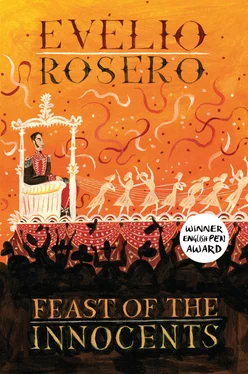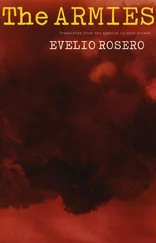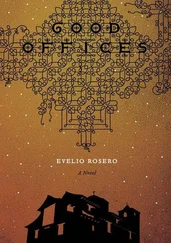Way up high, whiter and a hundred times more massive, was Furibundo Pita himself, seated at the wheel of his still-unfinished jeep — a jeep with a spectacular flatbed, crammed not only with pigs and hens, but tigers biting polystyrene arms and legs; there were dragons breathing fire between overflowing cardboard milk churns — it was a contraption imbued with life that leapt forward rather than rolled along on four monstrous wheels, Furibundo’s vast hand steering it, the other hand bearing down on the horn or klaxon or hooter, which was like a giant trumpet reaching up to the sky and, fleeing terrified in front of Furibundo and his Willys jeep — desperation on her face, flamboyant skirt flying above her waist, exaggerated buttocks — was Furibundo Pita’s own wife, the pious Alcira Sarasti, the kind-hearted, languid woman who went to Mass at the Franciscan church every evening and who, any day of the week, on leaving the church, had to face her husband, the brawling Arcángel de los Ríos, “father of my children” as she called him, who stalked her, chased her in his jeep, caught up with her, overtook her, came back at her and confronted her, fenced her in, and honked and accelerated and slowed down and honked and harassed until he had her cornered, after along and shameful pursuit, up against the front door of their house.
There was no-one in the whole of Pasto who had not seen this happen at some point.
Tulio Abril and Zulia Iscuandé knew the devout Sarasti very well, and not only felt sorry for her, but complained — as did many others — about this weekly abuse, and they also visited the grounds of the Franciscan church from time to time, as Mass was ending, just in case they should come across the pursued woman, suffering the Stations of her Calvary at a trot, across the twelve ill-fated and scandalous blocks that separated her from salvation.
“So you wanted to surprise me, Tulio,” Furibundo Pita said slowly, his gaze now fixed on the dirt floor while he shook his head, “and not just me, but Pasto too, the whole of Pasto, but at my expense, no?”
He gave the mud a kick.
No-one said anything. Martín Umbría and the oldest craftsmen positioned themselves around the maestro, as though they were protecting him. Only Zulia Iscuandé had opened her mouth and she was approaching him with a silent smile when Don Furibundo cut her off: “I didn’t come here to speak to women.”
And he stood firm in front of the maestro.
“You can’t do this to me,” he said. “Not to me, not to my wife. Who gives you the right to make fun of others, Tulio? Who do you think you are — God?”
The maestro did not answer.
“You succumbed to temptation. I know they call me Furibundo Pita because I like honking the horn too much, but so what? Who am I hurting? Have I ever run over my wife?”
He looked again at each and every one of them around him, as if scolding them all. Now he shouted: “Who’s to say she doesn’t like it? Who’s to say that the fact I chase her isn’t a game for her? It is a game, gentlemen, a game between me and her, between the two of us, so mind your own business, you utter bastards, you swine.”
Doctor Proceso was astonished by the words, and Don Furibundo confronted him too, as if railing against him .
“What would become of carnival,” he asked, “if we devoted ourselves to airing the sins of others? Or their humiliations? Or their embarrassments?”
The doctor immediately thought of Primavera. Don Furibundo kicked the ground again.
“I came here as a friend,” he said. “I brought half a dozen hens in the Willys, Tulio. The firemen drowned them with a hosing down, but there’s nothing wrong with them: they’ll make a good stew. Let’s eat and drink as friends.”
He looked at the float again out of the corner of his eye.
“But first,” he said, stressing his words, “first I want you to destroy this travesty with your own hammer, by God, Tulio, or I’ll get drunk right here, right now, Tulio.”
These last words, uttered as a terrible threat, made everyone freeze. Don Furibundo was getting hoarse, no more air in his lungs.
“You can be sure that if I’m drunk things will go rather differently,” he managed to say. “Who knows what I might take it into my head to do.”
He took a deep breath, let it out:
“So? Friends?”
“Friends,” the maestro said, with a sigh.
And he looked up at the foggy grey sky, and put his hands in his pockets and lowered his head.
“But I will finish my float,” he said.
Don Furibundo sagged. The maestro went on unperturbed: “I’m nobody’s enemy. I show what this year has seen, what we’ve all seen in Pasto for ages. That’s why we make floats, to remember the years, señor .”
Don Furibundo moved still closer to the maestro.
“You haven’t understood me,” he said. And he ordered the children to fetch the chickens. In no time at all, six appeared at the maestro’s feet.
“Those are not even worth the float’s hooter,” Zulia Iscuandé said.
“Very good, Señora Zulia,” Don Furibundo replied. “I should have let you have your say from the beginning. You’re right. I didn’t come here to offer these chickens in exchange for your goodwill. These are for you to cook and for us to sit down to eat and talk like friends and negotiate. Now,” he said, scratching his head, “if you are not decent enough to negotiate like this, I’m going to stop wasting your time: either you take the float apart or I’ll get drunk and tear it apart with my bare hands and then I’ll shoot the lot of you. I’m only too aware you’ve worked all year on this mockery, but is it my fault I only just found out about it? Just yesterday a little bird came to my window and asked me to please pop in to Maestro Abril’s workshop, as they were preparing a nice carnival surprise for me. I didn’t believe it at first, but I came along, and what do I see? I see that anything’s possible in Pasto when it comes to making fun of your fellow man and that it’s me who’s the victim. No, Tulio. I won’t allow it. I’ll blow you to bits, float and all, right now, all by myself, unaided.”
“No-one, not you, not anybody will make me take this float apart,” Maestro Abril said, unmoved.
And then:
“Fire as many bullets as you like.”
It was as if he considered the conversation over.
“Your wife has more common sense,” Don Furibundo replied. “She said six chickens aren’t worth the hooter. And she’s right.”
Zulia Iscuandé opened her mouth, but did not say a word.
“How much is first prize?” Don Furibundo asked everyone.
No-one answered.
“How much did the winning float get this past January?” he asked again, encouraging them. And as they still did not answer he added: “I’m playing my last card here, gentlemen, how much?”
“Lots of pesos,” came the sudden voice of one of the men who worked with Maestro Abril.
“Lots of pesos?” Don Furibundo laughed. “Well, find out how many there are in lots and I’ll sign you a promissory note for the same amount right now, and Bob’s your uncle, we all live happily ever after.”
Tulio Abril looked reproachfully at the artisan who had spoken. Then he sought out his wife, and, lastly, Don Furibundo. With great sadness in his voice, he said: “It can’t be done, señor , forgive me.”
“It can be done, Tulio. It can. Everything in this life can be done. In the next life, I don’t know. In this one, it can. Remember what our grandmas used to say: Yesterday came the dressmaker, tomorrow comes the undertaker. That means, in pure Pasto-ese: eat, drink and be merry . Think again, Tulio. Here, in front of my friend Doctor Justo Pastor Proceso Lopéz, I give my word of honour that you will get the same amount of money as the winning float in the carnival. Isn’t that enough for you? This is the money I pay for the work you have put into mocking me this year, it’s me that comes out the loser, dammit, don’t you get it? Where has this been seen before? Paying so as not to be made fun of? In Pasto, of course. You’re the one who should be paying me, you great prick, for mocking me.”
Читать дальше












